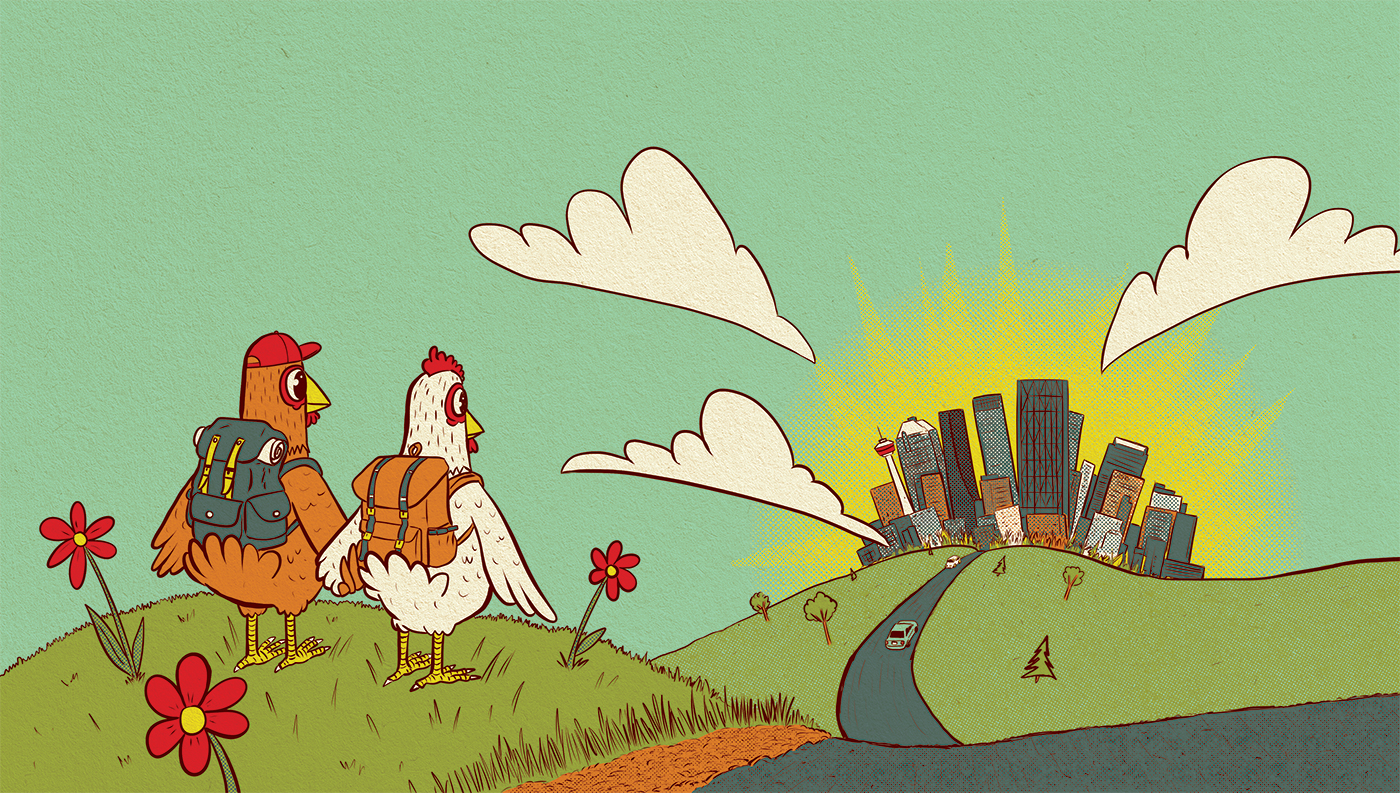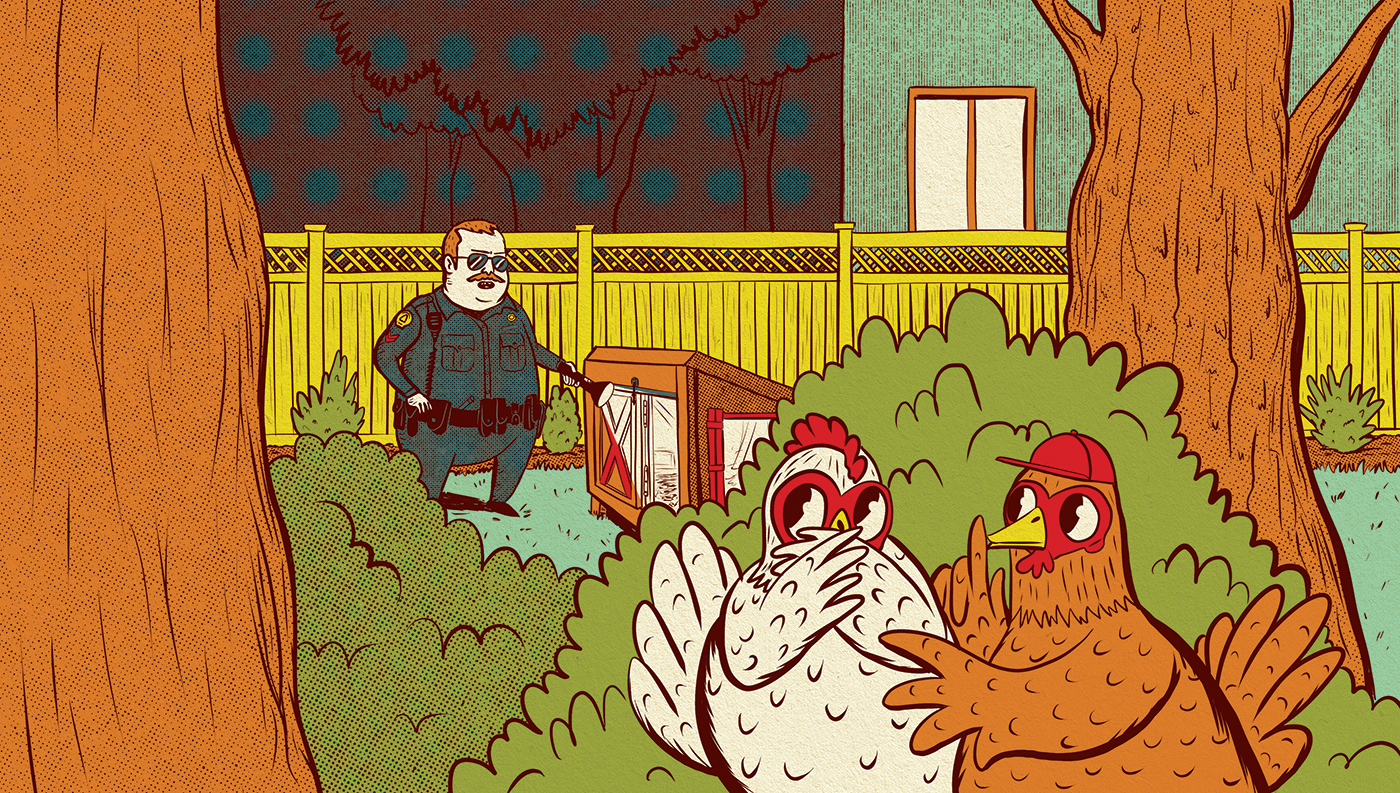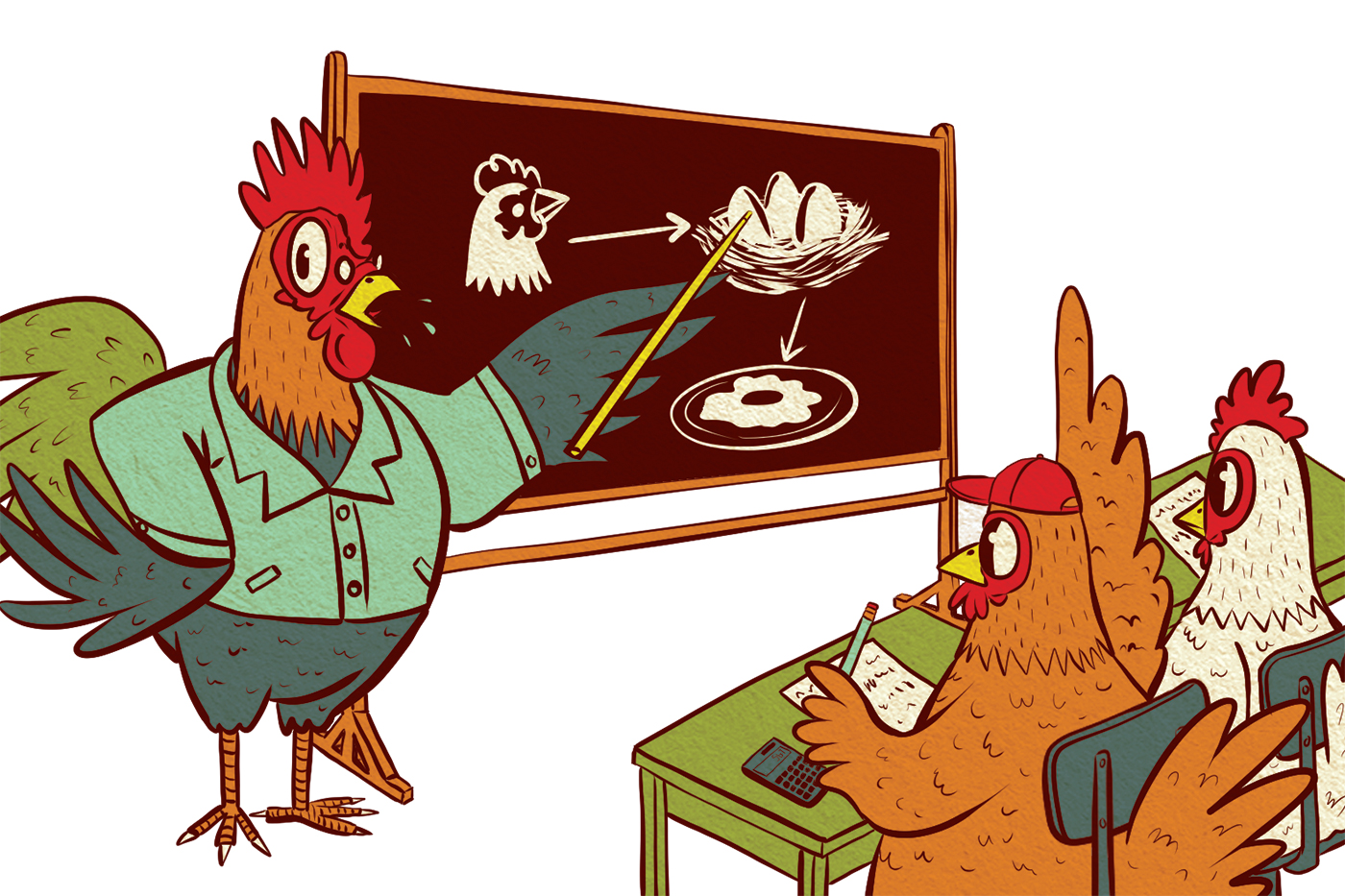
Move over, sourdough. Urban chickens are poised to become the latest stars of the “cottagecore” trend — the idealized (and very Instagrammable) take on peaceful country living that came into fashion while everyone was locked down in their urban homes.
After years of squawking, Calgary’s City Council approved a program in June 2021 that will allow residents to keep backyard hens as part of a series of changes to the Responsible Pet Ownership (RPO) bylaw. The bylaw changes went into effect as of Jan. 1 of this year, with the urban hen program expected to roll out through the spring. The move puts Calgary in line with major cities around North America that already allow backyard chickens, while also giving a tip of the hat to our history as an agricultural hub. After the past two pandemic years of developing at-home hobbies and supporting local movements to enhance the city’s food security and sustainability, the timing couldn’t be better to embrace the world of urban livestock.
To someone who is not already a chicken enthusiast — and do trust that there are bona fide enthusiasts in this city, with groups like Calgary Backyard Chickens and the Canadian Liberated Urban Chicken Klub (CLUCK) fighting the good fight — the right to keep chickens may not seem like a big deal.
They’re not cute and cuddly like cats and dogs (though chicken-lovers will argue they have great personalities). However, they do produce food, so while many folks enjoy them as pets, the case for keeping chickens is most firmly rooted in the sustainable food movement.
A young and healthy hen will lay one egg a day, so, if you have three or four birds, that’s enough for several breakfasts a week. In addition to the practical aspect, much like gardening, chicken keeping teaches both kids and adults just how much effort goes into even simple food production, creating a respect for agriculture that can result in changed habits to reduce food waste and better support local and sustainable producers.
Francine Gomes, co-owner of the Calgary-based Cluck N Cleaver fried chicken restaurants, doesn’t currently keep chickens in her suburban backyard. But she spent several years living in the Kootenays with more than 50 chickens on her property. “There’s a lack of access to knowledge about food and a lack of appreciation for what goes into making our food,” Gomes says. “This movement towards eating local and having a better understanding of food sustainability has been amazing to watch. Even though people may not all be growing their own food, when they see others doing it, at least they have an understanding that they should be wasting less of it. Too many of us don’t realize the amount of work and resources that go into producing food.”
Anyone who has ever heard the gentle cluck of hens from a (hopefully egg-generous) neighbour’s backyard knows that some defiant Calgarians have been stealthily keeping chickens for years. There has been a bylaw on the books since 2018 that has allowed a small number of people to keep birds as emotional support animals, which might sound strange, but chicken-lovers insist that they are therapeutic to be around.
With no anti-chicken patrol out looking for them, the City has long taken a “don’t ask, don’t tell” approach to backyard hens, only cracking down on illicit coops if a neighbour complains. Knowing that the underground chicken scene is a reality was part of the reason it made sense for council to ask the City to set up an official program to better ensure that the birds weren’t being mistreated.

Because this is a City initiative, it is not without restrictions. Only 100 chicken-keeping licences will be issued for the 2022-2023 season. Only hens are allowed (so that neighbours don’t have to wake up to a 5-a.m. “cock-a-doodle-doo”), with a general limit of four per yard, depending on the size and location of a property. Perhaps most importantly, prospective hen-keepers have to successfully take a hen-care class to assure the City that they know what they’re getting into before bringing a flock home. A licencee not abiding by the conditions of the program could have their licence revoked.
The benefit of being late to the urban hen party is that City officials and pro-chicken advocates were able to look at what has worked (or failed miserably) elsewhere. “We talked to a few other municipalities while we were developing the bylaw recommendations, just to get a sense of what their process had been like, and we’ll be looping back and talking with them again, and also with animal-care experts and some of the groups that are providing the hen training,” says Jennifer Lawlor, a business strategist with the City of Calgary.
Druh Farrell, the former councillor for Ward 7, says the chicken debate extended almost the entirety of her 20-year political career with the City (she served from 2001 to 2021) — right up there with bike lanes and secondary suites. Farrell had no issue supporting the move to allow backyard hens. Chicken programs in other cities haven’t resulted in major avian flu outbreaks or the smell of chicken waste wafting through the streets, and, while some vocal naysayers have painted a picture of a worst-case scenario where hoards of urban chickens would be running afoul, Farrell says that the vast majority of the constituents she spoke to were enthusiastically in favour of the new program. As well, there’s no evidence from other municipalities that backyard chickens would peck away at the fabric of residential life in Calgary.
“The approach by our bylaws team is reasonable and helps ameliorate some of the concerns people may have. I didn’t support limiting the licences, but it was a way to move forward to demonstrate that we have a handle on these issues that could arise,” Farrell says. “There are a lot more hens in people’s backyards than we’re aware of because hens are so quiet. I know they exist even though they are technically not allowed yet.” She adds that her office didn’t receive a single complaint in her 20 years as councillor.
The move to make room to keep chickens legally has local chicken-keeping advocates all a-twitter on social media. Gomes, for one, says she’s pleased about the new licensing program and has faith that Calgarians will embrace chicken-raising with a sense of duty and responsibility. She does see some potential issues if wannabe chicken-keepers were to jump in without doing their research, but feels the cautious approach to licensing will gently ease people into the world of chicken-keeping in a way that ensures the welfare of the birds.
“The idea of starting small is good and will probably help the City to work through all the kinks,” Gomes says. “If they went full-bore, it could end up being a catastrophe. But allowing just 100 people to start and making them take a course will help the City to get feedback and figure out what hurdles these backyard chicken-keepers are encountering.”
Seeing as the new keepers will be dealing with living creatures, there’s more at stake than with other hobbies that can be packed up and stored in the basement as interest wanes. This is where some smart entrepreneurship comes in, through some small-scale chicken rental companies that have popped up in rural areas surrounding Calgary (since, prior to the bylaw change, they couldn’t technically rent to Calgarians, wink wink, nudge, nudge).
Companies like The Urban Chicks rent out hens on a seasonal basis so that the chicken-curious can do a low-risk test run and enjoy a warm-weather season of fresh eggs, without having to deal with winterizing their chicken coops. The Urban Chicks rents out packages that include three hens, a coop, a season’s worth of feed and unlimited access to care advice. They drop everything off in May and then pick the birds and coop up once the snow starts to fly. Caring for chickens in the dead of an Alberta winter is not as idyllic as summertime chicken-keeping, so services like this relieve that burden. Owner Tammy Wheatley bought The Urban Chicks about three years ago. The business has been quite successful up to this point, and Wheatley says she received several inquiries from Calgarians planning on applying for 2022 licences since the bylaw changes were announced.
“Most of my clients just want to have them over the summer when it’s convenient,” Wheatley says. “I do have some on acreages who are just trying [chickens] out to see how it goes before they make a decision about winterizing. I have some conversations with people about how to winter hens, but it’s not easy and it’s not fun.”

Calgarian Sue Collis took the rental option in 2021, after gaining permission from her neighbours — albeit under the radar of municipal bylaw officers. As an avid gardener, Collis was interested in using chicken waste to enrich her soil, and, with COVID-19 preventing her from travelling, it seemed like a good time to give it a go. Even though the eggs weren’t her primary motivation, she says that fresh eggs have greatly improved her baking. (Tip: Eggs straight from the hen make for a superior lemon bar.)
Collis says her positive experience renting chickens in 2021 has got her thinking about renting again this year. (The provider even promised to design her a coop to match her house.) The only thing that may potentially hold her back, once again, is having them interfere with travel plans — aside from the winterization issue, chickens demand a fair bit of attention — though Collis says she has at least one friend who has expressed interest in caring for the hens in her absence. “Once you’ve looked after chickens for a few weeks, it’s pretty simple. But I don’t think I would have considered it without having had the rental experience,” Collis says.
Even though potential complaints like noise, disease and lack of cleanliness are unlikely to be a problem for conscientious chicken-keepers, the practice does have some pitfalls — though any major headaches will likely be felt by the owners, rather than by their neighbours. Perhaps, most importantly, for those who choose to buy rather than rent, there’s the issue of what happens to hens when they’re past their egg-bearing years.
A single hen will tend to lay about 250 eggs over the course of its lifetime. At their healthiest, hens lay one egg every day. As they age, they lay eggs less and less. They can still produce eggs for about six to seven years, but they will live to be about nine to 10 years old. In their post-laying years, they can be kept as pets, but, since the number of birds one can keep is limited, and most people want eggs, a lot of birds will end up going off to a slaughterhouse and possibly being turned into soup stock as they’re generally too tough to roast at that age.
None of this is unmanageable, but anyone imagining a cute backyard coop and an Instagrammable family of hens should keep in mind that the chicken life cycle can be complicated. “It’s not just about throwing a box in your backyard and putting some hens out there,” Wheatley says. “A lot of people are concerned about the welfare of the birds or that people don’t understand what’s involved. It’s going to be about education. You have to be checking on your chickens every day. It’s an every day adventure.”
With its cap of 100 licences, the new program is unlikely to bring chickens to every block in Calgary, and those who were blissfully unaware of the hush-hush coops that have existed in the city for decades are unlikely to perceive any change. But, for those who love chickens (and love harvesting fresh eggs), being able take their hobby public and build a real chicken-keeping culture in the city, the change is significant.
“I just really love chickens. When I had them, I went chicken-cuckoo,” says Gomes, who is considering getting some hens at her city home now that she doesn’t have to worry about keeping them covert. “I’ve never felt cuddly towards a chicken, but I definitely admire their personalities. They’re very diverse. I have a friend who taught her chicken card tricks. They are smarter than people think they are.”
Up-to-date information on the City of Calgary’s urban hen licensing program can be found at calgary.ca.
